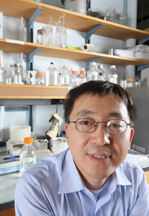

October 5, 2009
Protein helps cells duplicate correctly, avoid becoming cancer
WEST LAFAYETTE, Ind. - |
Xiaoqi Liu, an assistant professor of biochemistry, found that cytoplasmic linker protein-170, or CLIP-170, plays a major role in proper cell duplication and DNA distribution. When the protein is removed, cell duplicates lack entire copies of DNA and can become cancerous. Liu's findings were published in the early online version of the Journal of Biological Chemistry.
"DNA has to be equally distributed from a mother cell to its daughter cells. If the cells are not identical to the mother cell, they become cancer," Liu said. "Normal cells have a very tightly regulated process to avoid aneuploidy, or the unequal distribution of chromosomes. Aneuploidy is a hallmark of cancer."
A cell will go through two important processes before it divides: It will create a second copy of its own DNA, and it will create two centrosomes, or poles, that will act as magnets to draw the DNA to themselves. When the centrosomes have attracted the DNA, the cell divides in a process called mitosis, creating two identical cells.
But when CLIP-170 was removed from a cell in Liu's lab, more than two centrosomes formed, pulling only two copies of the DNA in several directions. Each centrosome received less than a full copy of the DNA.
"If there are multiple poles, the cell becomes confused and becomes cancerous or transformed," Liu said.
Liu also found that a cyclin-dependent kinase called Cdc2, activates CLIP-170 in cells by attaching a phosphate group to the protein. Cdc2 is an enzyme that is considered the master regulator of cell growth, and without it, CLIP-170 does not do its job and multiple centrosomes form.
"Without either of these, a cell has an increased chance of becoming a cancer cell," Liu said.
The National Institutes of Health funded Liu's research. Liu will continue to look for regulators and mechanisms that turn normal cells into cancer cells
Writer: Brian Wallheimer, 765-496-2050, bwallhei@purdue.edu
Source: Xiaoqi Liu, 765-496-3764, xiaoqi@purdue.edu
Purdue News Service: (765) 494-2096; purduenews@purdue.edu
PHOTO CAPTION:
Xiaoqi Liu found that the loss of a particular protein can lead to uneven distribution of DNA during cell duplication, causing those cells to become cancerous. (Purdue Agricultural Communication photo/Tom Campbell)
A publication-quality photo is available at https://www.purdue.edu/uns/images/+2009/liu-protein.jpg
CDC2-Mediated Phosphorylation of Clip-170 is Essential for its Inhibition of Centrosome Reduplication
Xiaoming Yang, Hongchang Li, Anping Deng and Xiaoqi Liu
CLIP-170, the founding member of microtubule plus ends tracking proteins, is involved in many critical microtubule-related functions, including recruitment of dynactin to the microtubule plus ends and formation of kinetochore-microtubule attachments during metaphase. Although it has been reported that CLIP-170 is a phosphoprotein, neither have individual phosphorylation sites been identified nor have the associated kinases been extensively studied. Herein, we identify Cdc2 as a kinase that phosphorylates CLIP-170. We show that Cdc2 interacts with CLIP-170 mediating its phosphorylation on Thr287 in vivo. Significantly, expression of CLIP-170 with a threonine 287 to alanine substitution (T287A) results in its mis-localization, accumulation of Plk1 and cyclin B, and block of the G2/M transition. Finally, we found that depletion of CLIP-170 leads to centrosome reduplication and that Cdc2 phosphorylation of CLIP-170 is required for the process. These results demonstrate that Cdc2-mediated phosphorylation of CLIP-170 is essential for the normal function of this protein during cell cycle progression.
To the News Service home page
